Suunto ZoneSense
-
@Danny-poleg thank you, that’s super helpful.
-
Walking on a 12 % incline, running on a 4 % incline on the treadmill (10 minutes warm up, then intervals with 3 minutes running and 2 minutes walking).
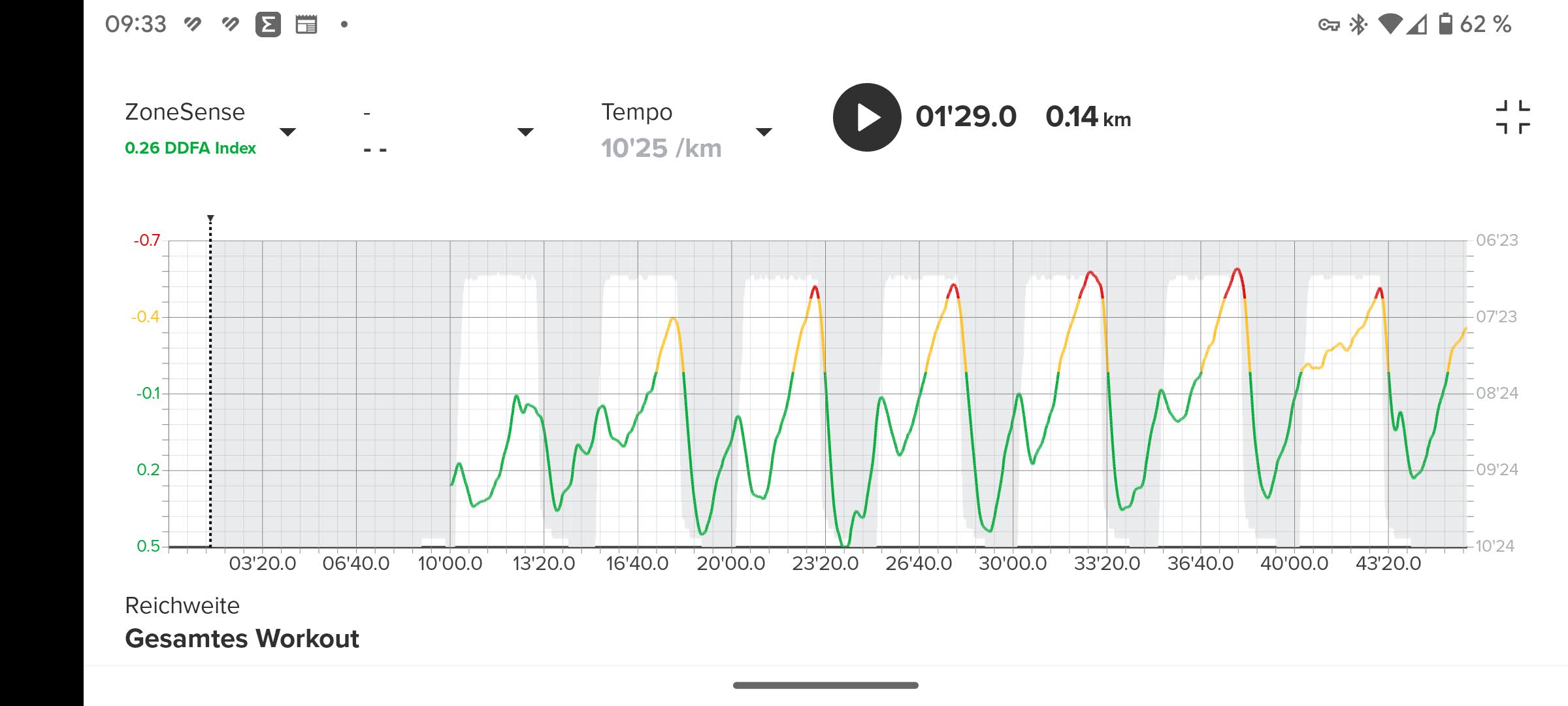
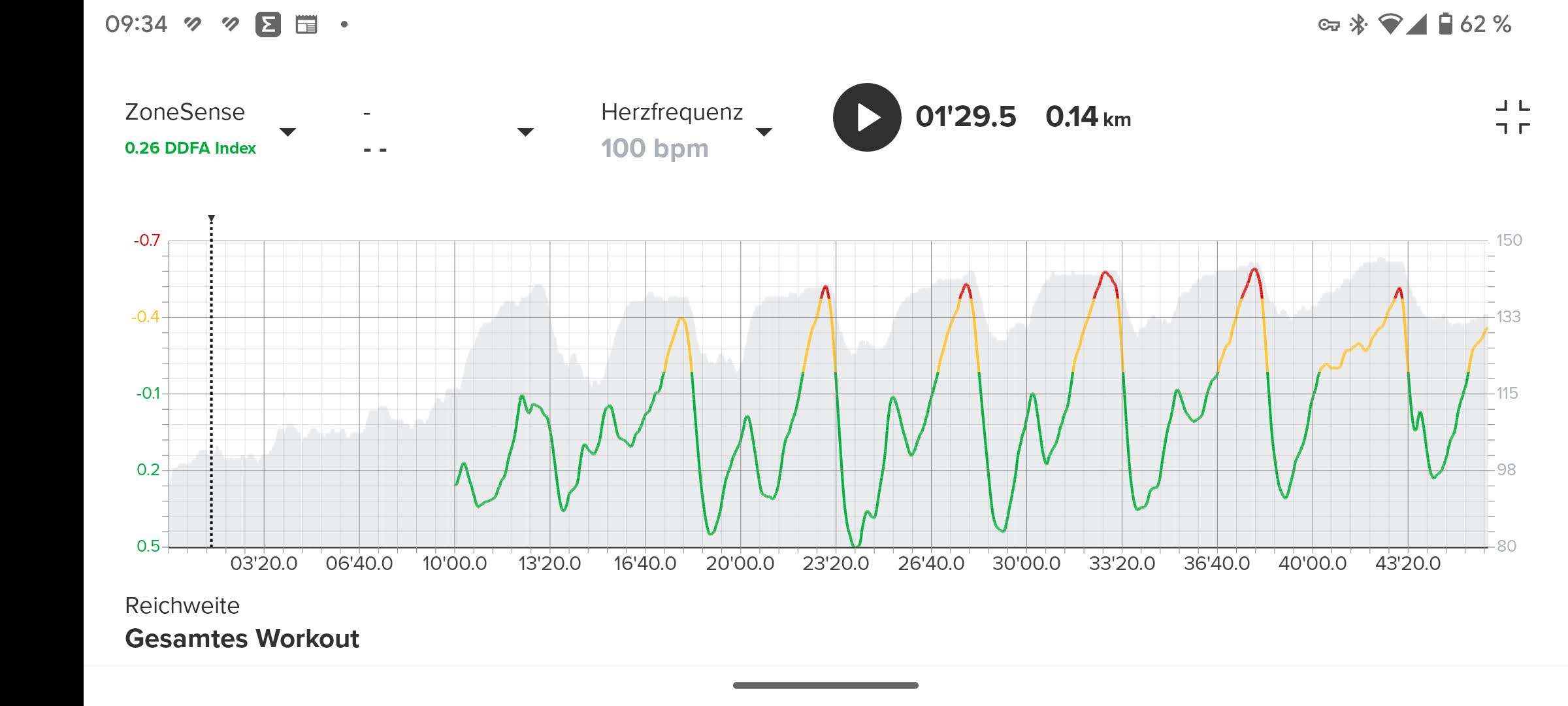
-
I ran a Cooper test.
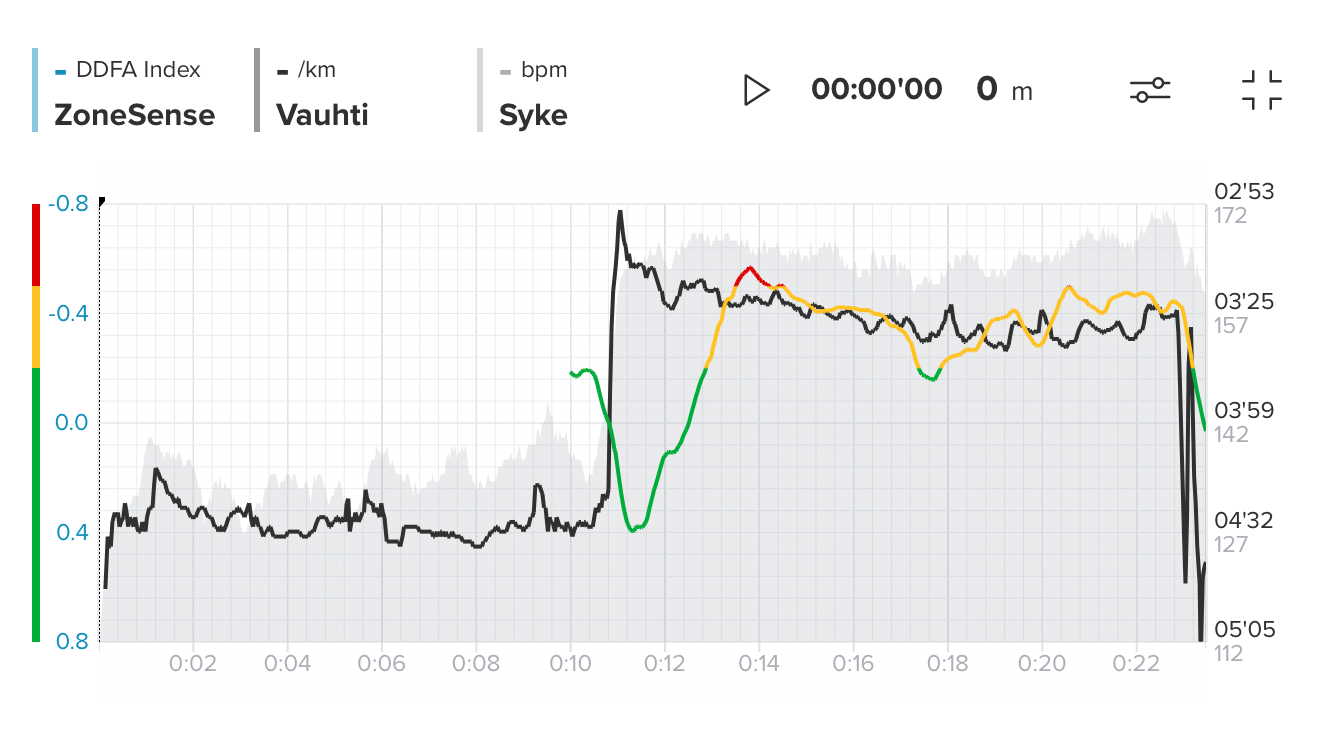
Could one interpret the graph that I wasn’t able to really give my best here since I didn’t really hit VO2 zone? Admittedly my taper for this wasn’t quite the way I would’ve liked so my legs weren’t the freshest.
P.S. App labeled this as “recovery.” Gee, how motivating!
 Is it the duration of under 30 mins that makes it so since 12 mins in Z5 apparently isn’t worth anything.
Is it the duration of under 30 mins that makes it so since 12 mins in Z5 apparently isn’t worth anything. -
@jussim I would say the graph looks pretty good relative to your effort (outside of that first spike)
-
Interesting read from Marco Altini’s blog:
https://marcoaltini.substack.com/p/q-and-a-what-are-your-current-thoughts
-
@Francesco-Pagano Oh, thanks so much for this article. I use Marco’s app but I haven’t noticed this opinion.
Well that could explain why in my personal case the ZoneSense is probably useless (or there could be possibly other reasons of course). I have a hard time trying to interpret results.
For me all the thresholds computed by the ZoneSense are way too low (sometimes even comically, like 30 beats under the lab measurement - measured with the H10 belt).
For example I spent 40 minutes around 165bpm and I get a LT 152 or something like that. That’s not possible I suppose:)
Even knowing that zones are shifting from day to day I am not sure how to work with it or what to take from it. There were a few times when it showed something that could make sense to me but… it’s not reliable for me to use it in a real time to guide my effort.
And I also wonder about the names of the zones… Why is the second zone called ANaerobic (without oxygen) and another zone called VO2max (like maximum oxygen uptake)? Wouldn’t it be better to call the zone moderate, or tempo, or threshold… I don’t know. It would make more sense to me
-
@Francesco-Pagano Curious to hear @Brad_Olwin’s thoughts on that article. For me, ZoneSense has been a game changer. I’m 50 years old, and it’s helped me a lot with RPE, controlling my training, and avoiding overtraining. I can say that I’m training more intelligently and have seen a real boost in my fitness.
-
@iterumtenta The article doesn’t say it doesn’t work. It just explains that it can’t work for everyone—like most things in sports physiology. Those static thresholds are likely based on some standard distribution, so it could work for the majority of users. However, for some individuals, it would need to be adjusted to better reflect their unique physiological characteristics.
-
@Zdeněk-Hruška Thanks for the precision! I’m pretty new to this world, and ZS been invaluable for me.
-
@iterumtenta Glad to read that you’re having great results with ZoneSense. So far I found it quite useful, too.
When it was launched I was just starting a base-building period within my running training. I chose to follow it blindly and see what it does. I had to adjust a little, making my easy runs even easier, and so far I have never reached a stressed, over-trained state despite of the high volume. Could I push a little bit more to increase my aerobic capacities? This I will never know.What the article points out is that for most individuals, DDFA is not a reliable enough indicator of metabolic thresholds, and that was written by someone who had previously sponsored those metrics to the point of building his own app for DFA analysis. This means that people like me will probably never get an estimate of LT1 and LT2 thresholds from ZoneSense (so far I got aerobic threshold - when it’s reported! - ranging from 129 to 149, really??)
As I said, I enjoyed using it for aerobic capacity training so far, though I would probably know myself how not to push too hard. When I start adding intensity training in two weeks, I will find out more. -
@Francesco-Pagano Just regarding the calculated thresholds - you should treat them like you would the trimp, epoc, vo2max etc for a run in that they are for that run. As the app says, if that run felt “normal” then the threshold suggestions can be used as an indication of your “normal” thresholds for setting HR zones but ZS is expected to fluctuate with stressors such as fatigue, illness, work/life stresses etc. on a daily basis.
-
Yesterday I had a strange issue with my zonesense: the timer of the 3 zones was regolarly running, but the earth rate indicator has been green for 2 hours without moving.
This was really annoying because it was difficult to find if I was in aerobic/anerobic/vo2max zone.
Anyone has experienced that before? -
@gliuk have you had target zone (HR/pace/power) set? I had similar issues when tried to use the two features together.
-
Ray (DC Rainmaker) is currently testing Zone Sense - I’m really looking forward to the results
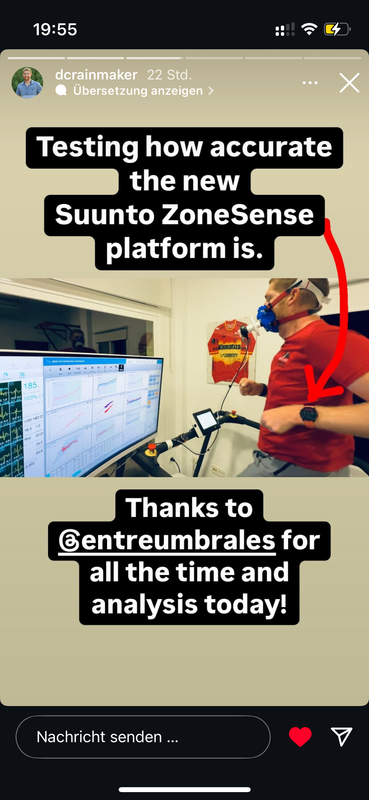
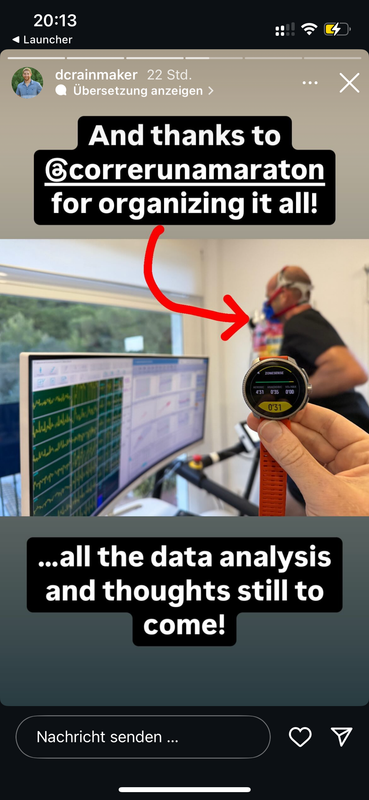
-
Apologies is these questions have been answered already, but with nearly 500 posts in this thread it’s hard to find.
In the following screenshot you can see that zonesense has determined the aerobic threshold for the session to be 138 bpm versus the 122 that corresponds to 70% of my Max HR (173).
[Max HR was determined not by a lab test or any formula, but rather by a 20 minute warm-up run, picking up the intensity for about 5 minutes followed by three 200m sprints with 400m recovery between each sprint, 173 bpm being the highest I was able to achieve on the last 2 sprints.]
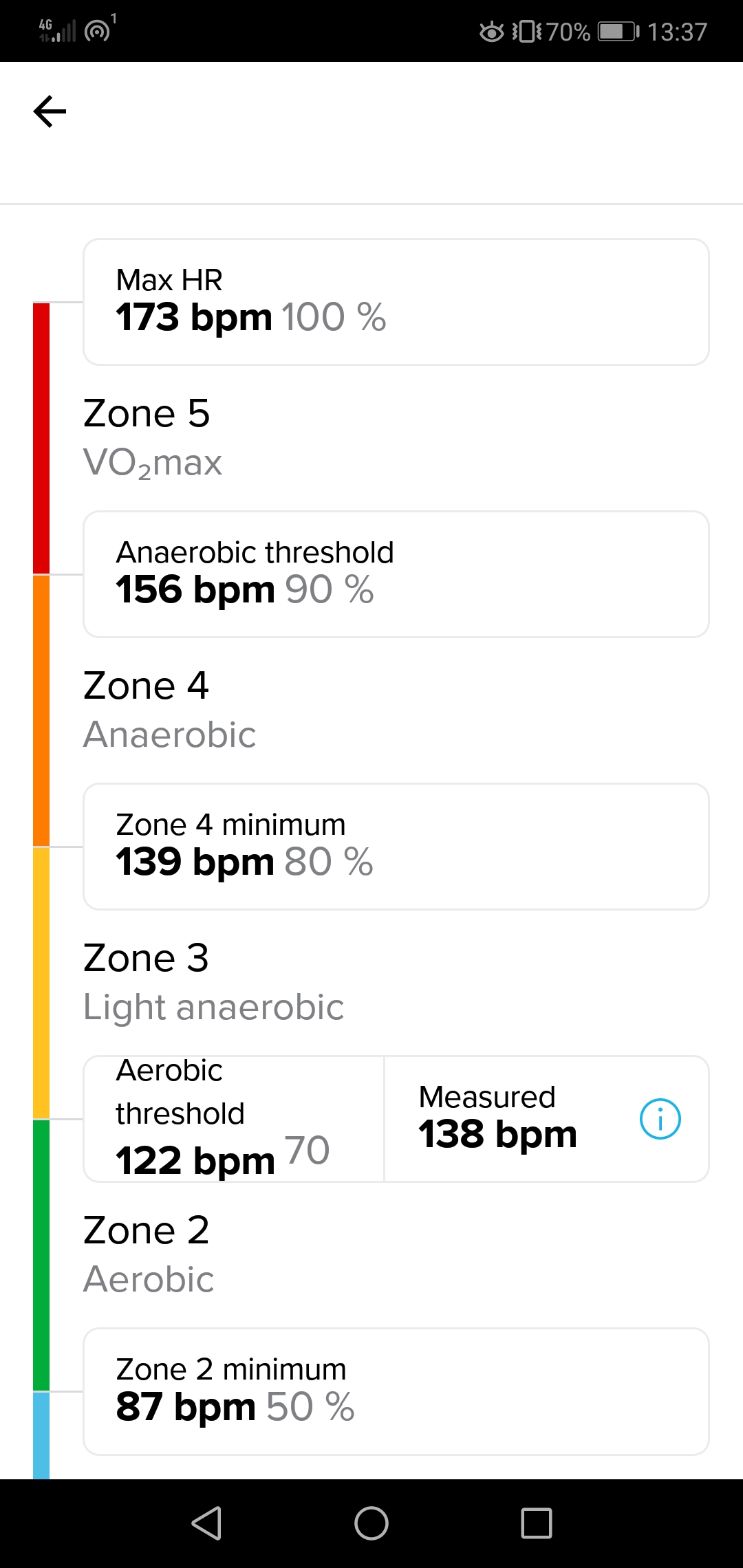
I now have 14 sessions similar to this (same sport, similar duration and perceived intensity), and 138 bpm is the median measurement for this group of sessions with variability being just under 2 standard deviations.
With that in mind, would it be advisable to reset my zones so that zone 3 starts at 138 which is only 1 bpm below 80% of my Max HR? How does that affect setting the limits for the other zones? In only 1 of those 14 sessions did zonesense provide a different anaerobic threshold from what I have set at 90% of max (156 bpm) and it was 162, so not as much difference when compared with the set vs. measured aerobic threshold.
One more question. Since zonesense doesn’t start providing data until 10 minutes into the exercise, and threshold calculations are only performed during the first 60 minutes, what is the actual starting point of that 60 minute window? Is it 60 minutes from the start of the exercise, or is it 60 minutes from when zonesense started registering data (70 minutes from the start of the exercise)?
BTW, I’m using an S9PP with Polar H10 (in case that info is relevant).
Any feedback / suggestions / advice will be greatly appreciated.
-
@Dareo The entire idea behind ZS is that your zones will differ depending on fatigue, heat, altitude, etc. Basically, zones are not and should not be fixed. As your fitness improves your zones will change and vice versa. With ZS you don’t need HR zones anymore. I pretty much don’t pay attention to mine but I was already running by RPE anyway.
You can reset your zones, your HR max is likely off and your settings of your zones clearly are off too. You can simply ignore them and use ZS or worry about where your zones would be.
I am ignoring my zones…
-
@Dareo Basically what @Brad_Olwin said
 But if you still like/use the more mature integration of HR zones into the watch for things like zone alerts, the zone display etc. then yes, you are doing it right by taking a few ZS suggested aerobic HR values to find a sensible median. Use this for your Z2/Z3 and then adjust in future if needed but remember ZS is going to give you better on-the-day threshold info. Maybe use the ZS app for threshold runs or progression runs and for races but HR zones for easy runs - whatever works for you
But if you still like/use the more mature integration of HR zones into the watch for things like zone alerts, the zone display etc. then yes, you are doing it right by taking a few ZS suggested aerobic HR values to find a sensible median. Use this for your Z2/Z3 and then adjust in future if needed but remember ZS is going to give you better on-the-day threshold info. Maybe use the ZS app for threshold runs or progression runs and for races but HR zones for easy runs - whatever works for you 
Regarding your max HR I’d suggest maybe doing a ramp test. This will likely give you a higher max HR plus ZS will likely give you an accurate Z4/Z5 (LT2) threshold recommendation. I’m not sure 200m sprints will give your heart rate time to actually hit a max.
-
@Brad_Olwin @far-blue Thanks for the input guys. FYI - I don’t race. I hit the road / trail / hills 3 - 4 times a week because it makes me feel good and, as a 63 year old retired veteran, I still have the mindset that my body needs to be prepared for whatever life throws at it. Thus my interest in getting a better understanding of my HR and threshold limits to know how much I can reasonably push myself and reduce the risk of over-training.
-
@Dareo said in Suunto ZoneSense:
@Brad_Olwin @far-blue Thanks for the input guys. FYI - I don’t race. I hit the road / trail / hills 3 - 4 times a week because it makes me feel good and, as a 63 year old retired veteran, I still have the mindset that my body needs to be prepared for whatever life throws at it. Thus my interest in getting a better understanding of my HR and threshold limits to know how much I can reasonably push myself and reduce the risk of over-training.
Excellent! I am older than you so keenly aware of overtraining. Using ZS you could plan for 70-80% of your efforts to be aerobic to very low anaerobic using ZS and 15% anaerobic, occasionally doing something hard in VO2M range.
As @far-blue stated, a ramp test or Cooper test will give you a good LT estimate and your ZS data a good estimate of AT.
-
@gone-troppo have you managed to get Zonesense results on the app …I’m having the same trouble